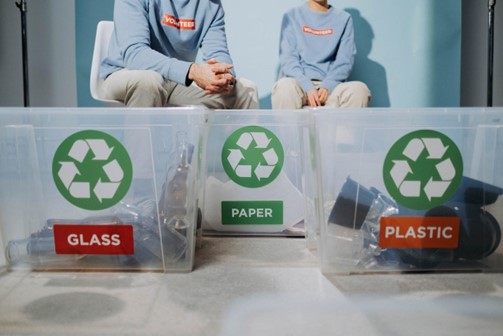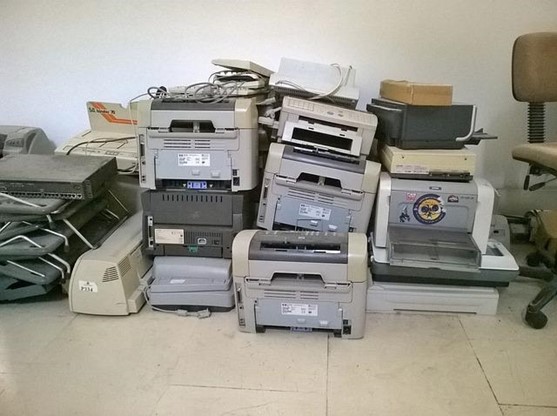Are you tired of breaking a sweat just thinking about the cleanliness of your gym?…
Managing Waste and Recycling During a Commercial Relocation

Amid the hustle and bustle of orchestrating a seamless commercial relocation, a critical facet often overlooked is having an environmentally friendly approach. The impact of waste and recycling during a commercial relocation reaches far beyond the physical transfer of goods. It encompasses environmental responsibility, legal compliance, and resource optimization. In this article, we embark on an insightful journey to understand the nuances of waste management and recycling within the context of a commercial relocation.
The Importance of Having an Eco-friendly Approach to Waste and Recycling During a Commercial Relocation
As the wheels of commerce turn, businesses periodically find themselves in the throes of relocation – a complex endeavor requiring a meticulous planning and execution. Yet, amid the flurry of logistics, waste, and recycling often remain on the sidelines of consideration and a mere afterthought. Unfortunately, besides the negative impact poorly handled waste can have on the environment, businesses could also face legal fines due to improper waste management. This article strives to cast light on the vital role of waste management and recycling in the relocation process.
Preparing for a Sustainable Relocation
The adage goes, “An ounce of prevention is worth a pound of cure.” This hypothesis holds when addressing how your company handles the waste created during your corporate relocation. Beyond mitigating environmental impact, minimizing waste can yield cost savings, bolster reputation, and improve corporate social responsibility.
Preparing for a sustainable and eco-friendly relocation demands a proactive approach that intertwines environmental responsibility with logistical precision. Businesses must assess their current waste generation and recycling practices, forming a baseline to gauge progress. Setting specific waste reduction goals aligned with the broader relocation objectives is imperative. Designating responsible individuals or teams to oversee waste management ensures accountability and streamlined execution. Simultaneously, identifying appropriate waste disposal and recycling facilities in the new location ensures a seamless transition.
Legal and Regulatory Considerations
Navigating the labyrinth of legal and regulatory frameworks is non-negotiable when delving into waste and recycling during a commercial relocation. Failure to adhere to waste disposal waste and recycling can culminate in undesirable consequences. Consequently, before embarking on the relocation journey, it is paramount to acquaint oneself with local ordinances and waste-handling guidelines. If you want commercial moving that adheres to the legal requirements, you can ask professional movers with experience to help you plan an eco-friendly relocation. Many green movers know the local laws and can provide you with an environmentally friendly service. Compliance ensures not only a smooth relocation process but also avoids legal entanglements.
Minimizing Unnecessary Waste
“Out with the old, in with the new” is a motto that gains renewed significance when contemplating a commercial relocation. To curtail waste production, adopt proactive measures. Try to implement sustainable solutions during your pre-move cleaning phase since you will undoubtedly go through decluttering before the relocation. Identifying and discarding unneeded items is essential for fast and easy relocation. However, removing old items and any resulting waste should be handled environmentally. Additionally, disposing of hazardous materials responsibly and utilizing existing supplies before replenishing them can substantially curtail waste output.
Sustainable Packing Practices
Packing, the quintessential facet of relocation, provides fertile ground for integrating sustainable practices. An array of eco-friendly alternatives exist, from reusable containers to biodegradable packing materials. The cardinal principle is to eschew excessive packaging and single-use plastics. While these measures might initially entail a degree of adjustment, they translate into long-term environmental and economic benefits.
Partnering with Recycling Facilities
The symbolic relationship between businesses and recycling centers is pivotal in the tapestry of waste and recycling during a commercial relocation. Establishing robust ties with these facilities fosters efficient waste disposal and recycling. Understanding the materials each facility accepts prevents erroneous waste management practices. Consider contracting local recycling programs or organizations that can offer indispensable guidance in aligning relocation practices with sustainability goals.
Preparing Your New Office
To ensure your business can hit the ground running in your new location, meticulous attention to cleaning and preparation is paramount. Consider using green cleaning practices, opting for non-toxic and biodegradable cleaning agents to ensure a healthy indoor environment. Collaborate with cleaning professionals who share the commitment to eco-friendliness. As you prepare the new office, focus on energy efficiency by inspecting lighting, HVAC systems, and appliances to ensure they meet or exceed green standards. Implementing a waste management system that encourage recycling and minimizes single-use items is essential. Consider incorporating sustainable materials for furnishing and decor, reducing the office’s carbon footprint. By approaching the cleaning and preparation phase with an eco-conscious mindset, businesses can create a fresh and inviting workspace while demonstrating their dedication to environmental stewardship.
Employee Engagement and Education
Employees are the gears that propel the corporate machinery. Their role in waste and recycling during a commercial relocation is indispensable. If you are not sure what you and your employees can do during the move, you can ask your moving company how you can help. There are many questions you should ask your movers to ensure you have a smooth relocation, and you should not hesitate to ask them. However, teaching your employees about long-term eco-friendly office culture is also essential. Actively engage employees in sustainable practices by imparting training on proper waste disposal techniques. Encourage participation in recycling initiatives and acknowledge commendable eco-conscious behavior. In doing so, a groundswell of environmentally responsible actions can emanate from within the organization.
Monitoring and Continuous Improvement
The path to optimal waste management extends beyond the relocation’s final destination. Monitoring waste management metrics in real time lends valuable insights into the effectiveness of adopted strategies. Regular assessments facilitate course correction and the evolution of sustainable practices. By instilling a culture of continuous improvement, businesses are better equipped to navigate the dynamic landscape of waste management. Additionally, implementing a routine of regular inspections and maintenance will help reduce your overall waste. Although you don’t have to handle the repairs yourself, it would be helpful to designate employees to ensure the inspections and repairs are organized according to the schedule.
Conclusion
In the symphony of commercial relocation, harmonizing waste and recycling into the orchestration is not merely an option – it’s a necessity. Waste and recycling during a commercial relocation unfurl a canvas painted with ecological consciousness, legal compliance, and ethical stewardship. With strategic planning, comprehensive education, and a proactive approach, businesses can curtail waste, amplify sustainability, and embark on a relocation journey that transform physical spaces and bolsters a commitment to the plant we collectively call home.



